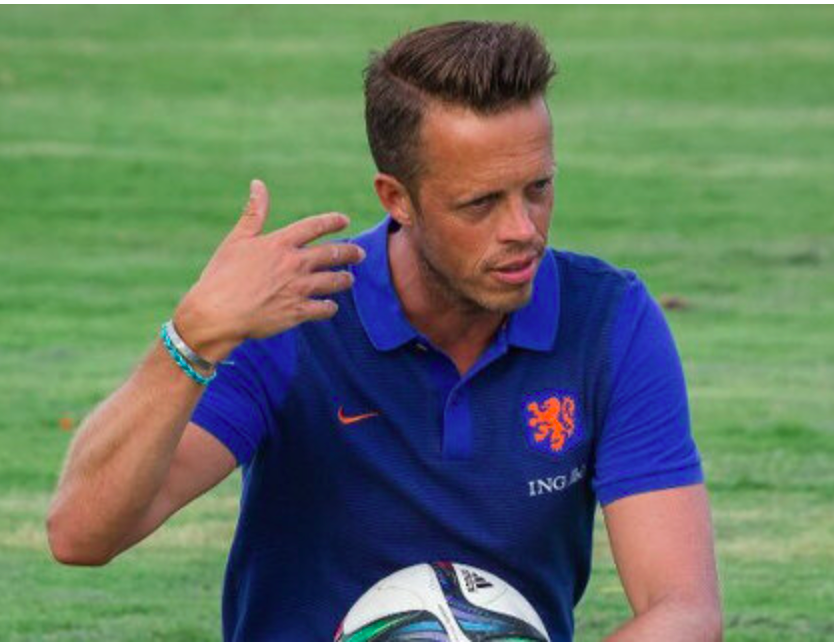
Jorg van der Breggen
Manager Football Development Dutch FA
A coach educated with a UEFA-A certification, Jorg has dedicated nearly two decades to working with children in sports, drawing on his background as a PE teacher, with a particular focus on football. His passion for football has been a constant since his youth, across a journey from a grassroots club to a Professional football Academy.
He was beginning as an assistant coach with the U17’s, later working independently with teams in the middle-age groups (U13 and up). Balancing his role as a teacher and coach, he eventually transitioned to a full-time position at the Academy, assuming responsibility for scouting/recruitment and fostering collaborations with grassroots clubs in the region. As his passion for influencing football policies grew, he made the move to the Dutch FA, the KNVB.
How would you define a parent’s role within the youth sports environment?
My answer to this question would be without any doubt: ‘very important, crucial’ in terms of giving children a sustainable live long sporting career! But I guess this wasn’t always my opinion, it grew this way through my experiences along the way. In my beginning as a younger starting coach I experienced this as quite difficult part of the job. It felt like, ‘they, the parents, had other ideas than I had… maybe sometimes it felt like they were the ‘enemy’ or something like that. At least that was my impression
Although at the grassroots clubs where I worked there was for example always a meeting at the beginning of the season with the parents where we introduced each other, our way of working, made some agreements and so on. But during and after the season we, didn’t meet again formally as a group. So there was hardly any more profound contact. The only moments where I really did speak with them, as I can recall about this period, was when their child had a problem or something negative happened. So probably this was the reason where my perception only grew in that way.
My perception changed during the years, especially when I started working at this professional Academy. I noticed that parents wanted to be involved, more than I was used to. And then I thought that this could be a good thing, because they have so much knowledge about their own kids, this could be very useful.
At that time, I also started realising by self-reflection that good coaching wasn’t only about preparing and organising suitable training sessions and helping the players by giving them advices in their development and making a line-up etc. It was a much more complex situation of comprehending the children, the footballers in who they are as a person and as footballer. What thrives them every day, what makes them happy or angry or sad and so on. As we always said getting to know the child behind the player. So, I realised that we needed to create an environment where we really knew each and every individual. And that as starting point that should make it more logical tot give them a good time at our academy where they were able to develop themselves to their best version. And this environment doesn’t only depend on my or the other coaches interactions with the players, but off course also with their parents.
So, my perception definitely changed during those years. My tendency in the beginning to maybe keep the parents away, because of the pressure and the hazzle changed completely by bringing them closer so they better understood what we were doing. The ‘enemy’ became the ‘resource’. And I really do think that as coaches we sometimes need to be a little bit humbler, because parents know their kids much better than we as coaches do. So, I believe that it is very important to make them a part of the process!
What are the benefits of being a positive youth sports parent?
If a parent supports their child in a positive way or is positively involved in the child’s sport and emphasizes on task-oriented thinking, in my opinion this is a ‘good and positive’ parent. The support of parent is a crucial one as we know, because they offer a base of trust, on which a child should always fall back on unconditionally.
Children themselves also indicate that they like their parents to be involved and support them in their sporting experiences. They like it when they get positive and supportive comments about their attitude, sportsmanship and commitment (Tasks). Instead of being put under pressure through certain behavior about performance and success. (Performance).
A positive involvement of parents (support and understanding) in a child’s sports activities results in higher levels of satisfaction and higher participation and commitment in sport for the rest of their lives.
Tell us how your parents supported you in becoming a player/coach/teacher?
The parents which I have met during my coaching years were as I would say most of the times good parents. I mean, off course as every parent they are proud of their child and they want the best for him or her. As a coach I always wanted the same, and that was also the best for their child: having fun in doing sports and being able to develop and become their best version of their selves.
So, in the end where on the same page! We have different knowledge about the children from our own perspective which I believe can really reinforce each other in a positive way!
What advice would you give any youth sports parents, with a talented son/daughter and ambition also drive to reach the highest level?
I would say the same as a sad before.
For me there would be no difference in supporting a ‘talented child’ or a less ‘talented’ child. I don’t like labelling children this way, because we know that development is so non-linear and we also know from research that people will act, or try to act like that label (whatever that looks like) or the other way around, whereas children can really make themselves redundant little.
The right support from the parents is for both crucial! And off course I know that having a child who’s trains more the investment of the parents in time and so on is more, but that doesn’t mean they need to behave different or they have more rights to behave themselves differently towards their sporting children.
In your experience as a coach, how can uneducated and non-supporting parents, affect players (short & long term)?
Too much pressure, contradicting the club/coach, effecting a players confidence, consequences on bad performance, rewards for goals/assists etc
This is a big problem. I therefore think this is a big responsibility for NA’s, Clubs and Coaches. We all need to take the responsibility to inform, coach, help, guide the parents to become more educated. We know that in several ways if parents are not educated or unsupported this really can be difficult for the children and/or difficult for the coaches. I summed up a couple of reasons:
When parental support or involvement goes to an unwanted amount, it can be difficult for the child, as it often causes them to experience pressure.
Difficult parents are parents who express themselves negatively by expressing themselves negatively towards their child (for example on their way home in the car, a.k.a. ‘the driving prison’) or the coach, club or referee.
When the behavior is mainly focused on the results or outcomes, with a deeper desire that the child should be given all the opportunities and exploited to bring out the best that is in the child that also can be difficult. Of course in principle it’s not a bad idea in a way, but by exhibiting this negative behavior, the parent imposes especially unnecessary pressure on the child, which means that the child in all likelihood has less fun in the sport (and will certainly not achieve this ‘success’).
Another way of troublesome parents is a growing group that is referred to as a ‘helicopter parent’, ‘curling parent’ or ‘snowplow parent’. This type of parents want to remove obstacles from their children with the best intentions, based on the idea of making their child grow up as optimally and carefree as possible. However, by taking away the ‘proverbial snow’, these parents do not serve their child.
What advice would you give coaches/clubs regarding youth sports parents?
My advice would be that coaches and clubs would all agree that parents have a necessary and important role in a good pedagogical sporting development of the child. It’s required that coaches and parents must work closely together to create a good sport environment for the child.
What advice would you give youth sports parents for the car journey to and from youth sports practices and/or games?
We know that children themselves indicate that they like their parents to be involved and support them in their sports experiences. Positive and supportive comments about their attitude, sportsmanship and commitment are preferred over behavior that puts a lot of pressure on performance and success.
And finally, I would say the most important is to really enjoy your child having fun by playing and allowing him or her to make mistakes. Cause then the learning happens. Do not live your own dreams through your child but support your child. And support your coach, try to be a team together in the best interest of your child.
Thank you to Jorg for taking the time to complete the following interview questions.
Twitter: @JvanderB78 | Instagram: jvdb_78










